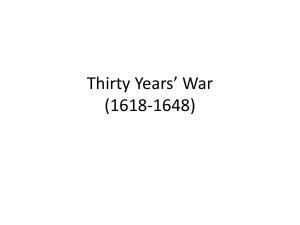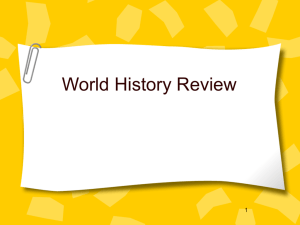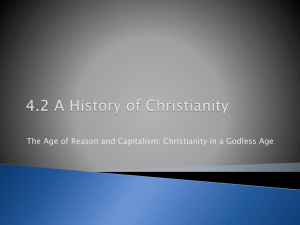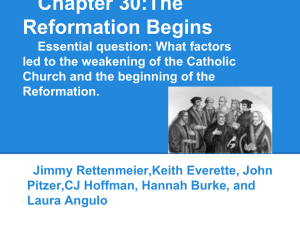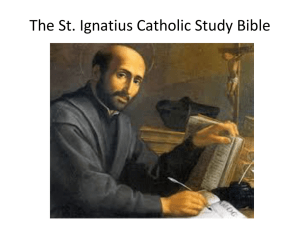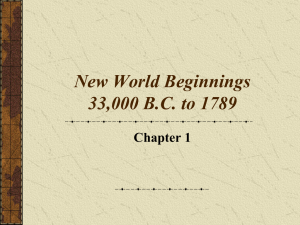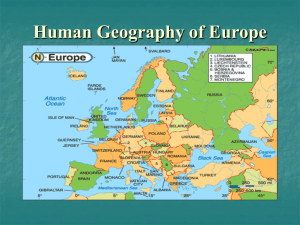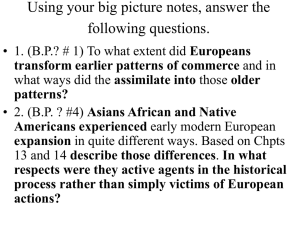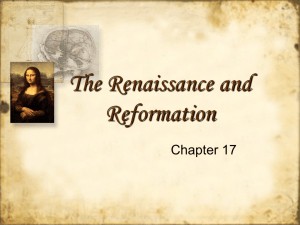Chapter 31 PowerPoint - Washington Middle School
advertisement
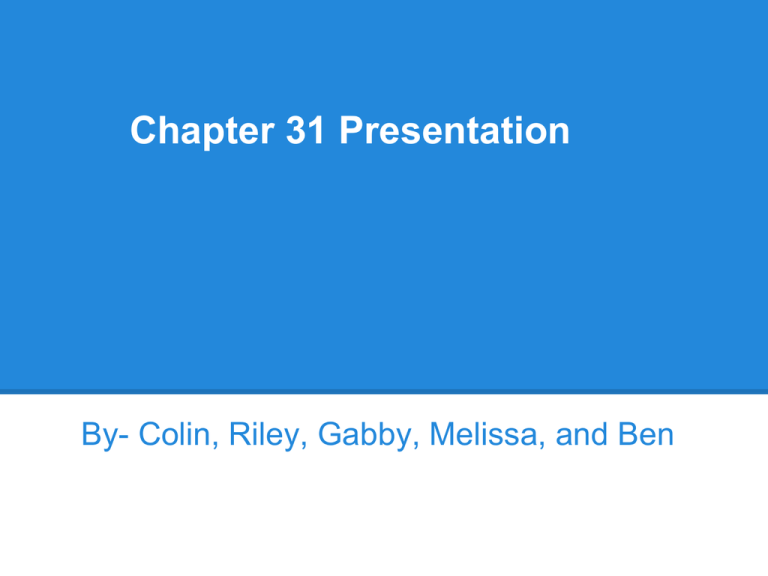
Chapter 31 Presentation By- Colin, Riley, Gabby, Melissa, and Ben Learning Targets • • • • • • I can... List and compare key Beliefs of the three Protestant religions I can analyze how the Counter-Reformation revitalized the Catholic Church Locate and label Catholic and Protestant regions on map of Europe Locate Christian Missions in early modern period Describe long, short term effects of the Reformation Key Content Terms-Ch. 31 Reform- To alter, in process to improve. Error-Something different from correct. Lutheranism-Protestant belief of Christian faith,established by Martin Luther. Calvinism- Protestant belief of Christian faith, founded by John Calvin. Consequently- Result of, outcome. Theocracy- Government where God is the ruler and officials conducted and execute in God's name. Key Content Terms-Ch. 31 (2) Anglicanism- Protestant denomination of Christian faith founded by Henry VIII in England. Counter-Reformation- Movement by Catholic Church, triggered by the Reformation, where Catholic leaders attempted to redirect/correct abuse,clarify and advocate Catholic educations, to accuse Protestant errors, and to successfully re-acquiring members. Nationalism- To associate and devote to one's nation. Absolute Monarchy- Monarchy where the ruler possess unlimited power. Puritans- English Protestants whose intentions are to "purify" the Anglican Church of its Catholic elements. Reformation (1500-1600) Reformation-a religious reform movement that led to the formation of new christian groups The reformation was the weakening of the catholic church, due to accusations of corruption within the church. People believed in the teachings of the bible rather than the church. This lead to splits in the religion, making some new religions all together, while still retaining Christianity. Essential Question- What were the effects of the Reformation? • • • • • • Created Lutheranism, Calvinism, and Anglicanism Catholic Church commenced Counter-Reformation A civil war between the Christian religions (Thirty Year War, Protestant Vs. Catholic) It caused a rise in nationalism (People identified by nation rather than local area) Monarchies grew stronger by using the idea of the divine right of kings (Idea that rulers received authority from God) and establishing absolute monarchies;unlimited power Europe started to explore the world and as they did they spread christianity Definitions of Lutheranism, Calvinism, and Anglicanism Lutheranism-a Protestant denomination of Christian faith founded by Martin Luther Calvinism-a Protestant denomination of Christian faith founded by John Calvin Anglicanism-a Protestant denomination of Christian faith founded by Henry VIII in England Beliefs of Lutheranism, Calvinism, and Anglicanism (Lutheranism) • • • • • • • Believe that following religious teachings lead to salvation Essential to take part in sacraments Believe baptism washed away original sin Do not believe that anything could be done to get to salvation Believe that the bible was the only source of guidance Use altars, candles, and crucifixes Believe in communion with bread and wine Lutheran Beliefs cont. • • • • • • • Services include bible readings and singing of hymns Prayers written in and recited in German Believe in only two sacraments (baptism and communion) Fathers should teach kids religion If they did not pray they got no food or drink Believed married women should give birth to as many kids as possible Ministers and clergy members are allowed to Beliefs of Lutheranism, Calvinism, and Anglicanism (Calvinism) • • • • • • Teach that people depended on God to be saved Believe no one deserved salvation instead they believed God chose people Teach that God knew who would be saved and who wouldn't Believe everything is controlled by God Believe the world is full of sin Forbid singing, dancing, playing cards, and wearing fancy clothes Calvinist Beliefs cont. • • • • • • Believe bible is the only true and accurate religious source Church leaders make laws based on the bible Believe all life should be lived based on God's law Religious rules translated into government laws Committing crime was also a sin Services are held five times a week and Calvinist Beliefs cont. (3) • • • • Use only two sacraments found in bible (baptism and communion) Are not allowed to sing in services unless in bible Believe each community should have a theocratic government Parents could only name children certain names from the bible Beliefs of Lutheranism, Calvinism, and Anglicanism (Anglicanism) • • • • • • Believe baptism washes away original sin Believe to go to heaven one only needs to believe in God Practiced privacy in their religions English monarch interpreted bible with the help of the arch bishop Two versions of Anglican church services services (high church service similar to Catholic mass) (low church service similar to Lutheran services) Used only two sacraments (baptism and Common Beliefs of Lutheranism, Calvinism, and Anglicanism • • • • • • All broke away from Catholicism Christian belief, believe in Jesus All believe the bible is the only true religious source All only believe in two sacraments (baptism and communion) All have a belief in Heaven, Paradise, Sanctuary, Bliss, etc. All believed in justification by faith Common Beliefs of Lutheranism and Calvinism • • • Both set hymns to popular tunes to make them easier to learn Both believed God choose who went to Heaven, nothing to earn it Both believed in passing up opportunities to sin=Selected for Heaven Common Beliefs of Lutheranism and Anglicanism • • • Both produced alternate language prayer books(L. German, A. English) Both services had elements of Catholic Mass Utilized hymns to help prayers Common Beliefs of Calvinism and Anglicism • In both of their churches there was no art, sculptures, or windows The Counter-Reformation Counter-Reformation-a movement of the Catholic Church, in reaction to the Reformation, in which Catholic leaders worked to correct abuses, to clarify and defend Catholic teachings, to condemn what they saw as Protestant errors, and to win back members The Revitalization of the Catholic Church • • • • • • • The Council of Trent was formed Gave more precise statements of Catholic teachings Declared that each individual had a role in the fate of their soul Agreed salvation was God's gift Rejected justification by faith alone Reaffirmed the Catholic belief in the seven sacraments Insisted the church's authority to interpret the The Revitalization of the Catholic Church cont. • • • • • • • Trained clergy members more efficiently Corrected the church's abuse of money Established more consistent rules Raised clergy standard of many things The Spanish nun Teresa of Avila inspired Catholics return to traditional Catholic beliefs Condemned errors of Protestantism Established the Inquisition European Christian Countries (100% Catholic) (Blue) • • • • • • • • France Spain Portugal Ireland Spanish Netherlands Papal States Naples Southwestern Holy roman empire European Christian Countries (Catholic/Protestant)(Purple) • • • • • Poland Lithuania Hungary Southern and scattered areas in France Eastern Holy Roman Empire European Christian Countries (Lutheran)(Red) • • • • Norway Sweden Denmark Northeastern Holy Roman Empire European Christian Countries (Anglicanism)(Green) • • • England England And England!! European Christian Countries (Calvinist)(Orange) • • • Scotland Netherlands Scattered throughout the Holy Roman Empire Christian Mission Locations (Catholicism) • • • • • • Jesuit missionaries brought Catholicism to India China Japan Southeast Asia French settlers brought Catholicism to Canada Mississippi Valley Catholic Missions cont. • • • Spanish and Portuguese brought Catholicism to the American southwest Mexico South America Christian Mission Locations (Protestantism) • • • • Ceylon India Indonesia The Europeans also brought it to the Americas Long Term Effects of Reformation • • • • • Lutheranism, Calvinism, and Anglicanism are created Catholicism changed many factors that weakened the Church The religions signed a peace treaty (the Peace of Westphalia) Boundries of relgions Began modern democracy in Europe Idea of Nationalism exposed Short Term Effects of Reformation • • • Religious wars raged (Thirty Year's War) People were prosecuted for beliefs Monarchy was re-established, only for short, not present in modern time
